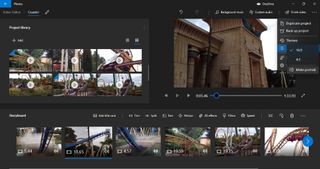[ad_1]
For free video editing software hidden in the windows Photo editor We didn’t expect much from the app.
Last time we checked Microsoft video editor, we praised it for offering “a good range of tools for the budding video editor whose goal is to quickly create a fun little movie”. Yes, it has limitations if you are looking for a powerful, full-featured video editor. For the basics, however, it earned an impressive 4-star rating.
But what new features, effects, and tools has Microsoft added since then?
Do you need more power in the mail? We checked them best video editing software and the The best video editing apps for Android, iPhone and iPad.
Fewer features?
The thing is, at first glance, there doesn’t seem to be anything new. In fact, we noticed that when you create a new project, the Auto Video option isn’t there. Is Microsoft still trying to emulate Apple? Yes, Apple removed this feature when they left iMovie 6 and called it an upgrade, but that was over a decade ago.
We’ve had trouble sourcing information to let us know about new features. The problem with a tool that lives inside another tool is that most people focus on that tool’s primary function — what you can do with it photo storage apartment
So we decided to find out what you can do with Microsoft Video Editor. And if it feels different than the last time we checked.
editing
First you need to bring in clips to work with. You can retrieve them from your own library of photos, find them on your PC, or download them from yours Cloud storageas long as the cloud account is Microsoft OneDrive, which is well integrated here. You don’t seem to be able to connect to other online services. A Microsoft app that forces you to use a Microsoft service. Who would have thought?
The concept of editing is the same as before. Each clip is represented by a thumbnail image that is exactly the same size, regardless of the clip’s length. This makes them easy to see, but it can be confusing when a 2 second clip is the same length as a 30 second clip.
What’s frustrating is that you can’t preview a clip before adding it to your project. Sure you can see a thumbnail of it, but how do you know that’s the correct clip of Harry when you’re looking at three different clips of Harry that were recorded on the same day?
There’s also no way to set In or Out points to just paste the section you want. Sure, you have a trim tool available, but only if the clip has been added to the timeline.
The playhead is also a problem. Typically, you’ll see a playhead (called the “storyboard” here) above the timeline so you know what you’re seeing in the main preview window and how it connects to your project. There is no playhead. Yes, you have a playhead in the preview window, but not on the timeline, creating a separation that’s hard to bridge and harder to edit.
Another problem that still persists is the lack of support for “modern” file formats. We used quotation marks because they’re not exactly modern. They’ve been around for almost five years, which is an eternity in computer terms. However, the support does not come by default.
You can go to the Microsoft Store and get the necessary extensions. HEIF photo extension is free. You need to pay for HEVC extension for videos.
It only costs $0.99/79 pence, but we’re talking about a multi-billion dollar multinational company. You could easily bear this cost, just like much smaller companies that support this format by default. This is Microsoft at its worst.
ratios and reframing
We no longer live in a world where projects are all produced in the same format. Nowadays we have to make sure that we create a video in the aspect ratio that works best for the social media Platform on which to see it. tick tock? 9:16. Instagram? 1:1 chirp? Ideally 1:1, but they are quite flexible. youtube? Ideally 16:9. You get the picture (and so does your adoring audience).
How does Microsoft Video Editor manage this? Well, you can scroll down a menu and choose between 16:9 or 4:3, or crop the image to fit a portrait orientation (essentially 9:16 or 3:4).
Couple this with the reframe button to remove black borders and you might manage to use this app to resize a project at will. However, you’ll need to do this trimming for each of your clips – there’s no “Change All” option that we could find.
Except that reframing is done automatically with no AI involved. It will be framed in the middle regardless of what’s going on in the clip. If the action is right from left, it may be clipped, and we couldn’t find a way to manually change the border.
Not all bad
It’s not all bad. There are some fun features hidden in this video editing software. You have access to a library of 3D effects and objects to add to your video. It is indeed fun. Just not particularly useful. The results will not be able to keep up with the top class 3D modeling software or Visual effects software how Adobe After Effects.
The editing options are pretty minimal, and we felt like these tools could be so much better than they are.
They also have some pre-made color filters, and “motion” is a way to pan and zoom in and out on your clip. There is a list of backgrounds music samples to choose from, with an interesting “sync your video to the beat of the music” option that actually worked pretty well.
export
When you’re done, you can export your project. You will be given three quality options, with the best being selected by default. Difficult to understand why some would want to save their work in less than the best quality, but at least you have that option when you need it.
Final Verdict
Microsoft Video Editor is an extremely basic video editing tool with very limited options. Editing a movie is more cumbersome than it should be. Worse still, there doesn’t seem to have been any decent improvements in a while. That is Windows Movie Maker without the charm (or nostalgia, for that matter). .
There are competing free video editor apps that do a better job than this one. At least it comes with your PC, so you don’t have to install anything extra and you don’t need it The best computers for video editing to start editing. That’s a big plus in its favor. But there’s little else to recommend until Microsoft beefs up the program’s toolkit.
[ad_2]
Source link






